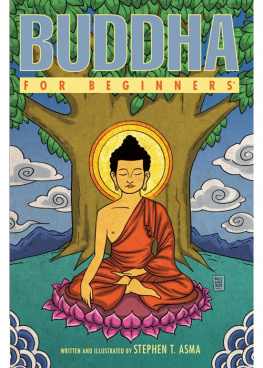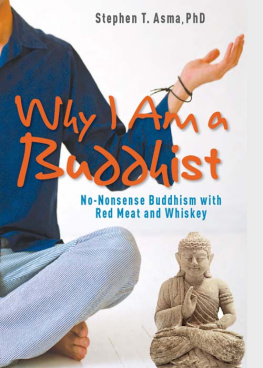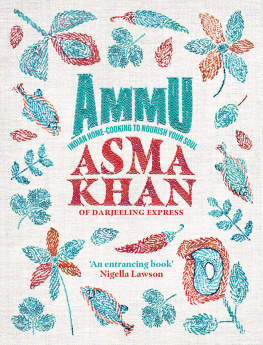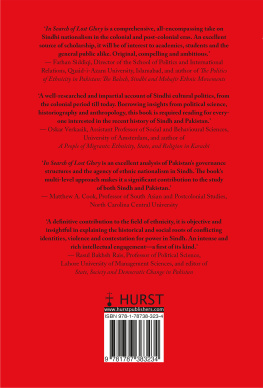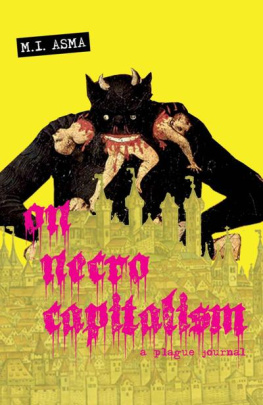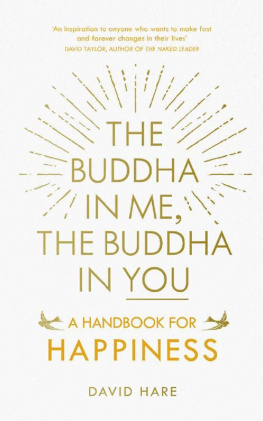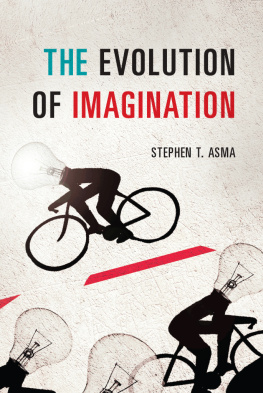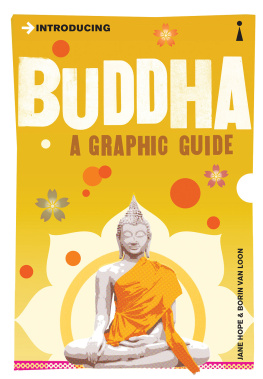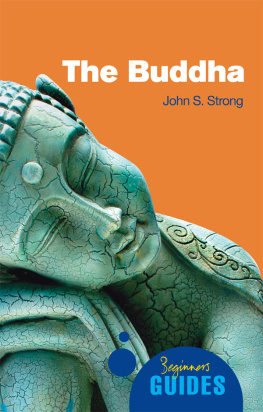Stephen T. Asma - Buddha For Beginners
Here you can read online Stephen T. Asma - Buddha For Beginners full text of the book (entire story) in english for free. Download pdf and epub, get meaning, cover and reviews about this ebook. year: 2015, publisher: For Beginners, genre: Religion. Description of the work, (preface) as well as reviews are available. Best literature library LitArk.com created for fans of good reading and offers a wide selection of genres:
Romance novel
Science fiction
Adventure
Detective
Science
History
Home and family
Prose
Art
Politics
Computer
Non-fiction
Religion
Business
Children
Humor
Choose a favorite category and find really read worthwhile books. Enjoy immersion in the world of imagination, feel the emotions of the characters or learn something new for yourself, make an fascinating discovery.
- Book:Buddha For Beginners
- Author:
- Publisher:For Beginners
- Genre:
- Year:2015
- Rating:4 / 5
- Favourites:Add to favourites
- Your mark:
- 80
- 1
- 2
- 3
- 4
- 5
Buddha For Beginners: summary, description and annotation
We offer to read an annotation, description, summary or preface (depends on what the author of the book "Buddha For Beginners" wrote himself). If you haven't found the necessary information about the book — write in the comments, we will try to find it.
Buddha For Beginners — read online for free the complete book (whole text) full work
Below is the text of the book, divided by pages. System saving the place of the last page read, allows you to conveniently read the book "Buddha For Beginners" online for free, without having to search again every time where you left off. Put a bookmark, and you can go to the page where you finished reading at any time.
Font size:
Interval:
Bookmark:

Also by Stephen T. Asma
The Gods Drink Whiskey
Why I am a Buddhist
Against Fairness
On Monsters
Stuffed Animals and Pickled Heads

For Beginners LLC
155 Main Street, Suite 211
Danbury, CT 06810 USA
www.forbeginnersbooks.com
Text and Illustrations 2008 By Stephen T. Asma
This book is sold subject to the condition that it shall not, by way of trade or otherwise, be lent, re-sold, hired out, or otherwise circulated without the publisher's prior consent in any form of binding or cover other than that in which it is published and without a similar condition being imposed on the subsequent purchaser.
All rights reserved. No part of this publication may be reproduced, stored in a retrieval system, or transmitted in any form or by any means, electronic, mechanical, photocopying, recording, or otherwise, without prior permission of the publisher.
A For Beginners Documentary Comic Book
Originally published by Writers and Readers, Inc.
Copyright 2015
Cataloging-in-Publication information is available from the Library of Congress.
ISBN # 978-1-939994-33-2 Trade
Manufactured in the United States of America
For Beginners and Beginners Documentary Comic Books are published by For Beginners LLC.
First Edition
10 9 8 7 6 5 4 3 2 1
www.redwheelweiser.com
www.redwheelweiser.com/newsletter
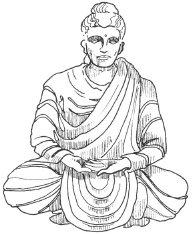
First, in this and all things, my little Julien, and his mother, Wen.
Next, I wish to express my thanks to those who helped create and support this book, both in its earlier incarnation and its present manifestation. Many thanks to Jane Hagaman, Stacey Ruderman, and my old friend Peter Altenberg. Many years ago, Heidi Wagreich inspired much of the humor in this book and I remain grateful. I wish to acknowledge the fine folks at Hampton Roads Publishing, also my wonderful colleagues at Columbia College Chicago. Special thanks to my editor Greg Brandenburgha kindred goat, in a land of sheep. I am grateful to those friends, students, and teachers who understood that laughter is the proper response to sacrosanct dogma. Finally, this book is dedicated to my parents, Ed and Carol, who must be Bodhisattvas in disguise.
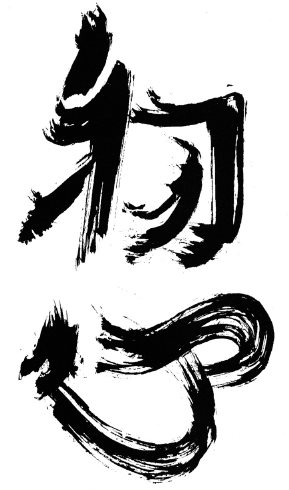
T his book first appeared in the late 1990s and found a substantial audience among the Buddha-curious, and even initiated Buddhist practitioners. Over the years it has been translated into Spanish, Hindi, and Chinese. I am proud to bring out this new revised edition with Hampton Roads Publishing, because it allows me to clarify further and nuance the basic arguments of the Buddha.
The original impetus for this book was the fact that Buddhism seemed deeply misunderstood in the West; unfortunately, that fact has not changed much. Unlike most other religious scriptures, which are comprised of parables, legends, and allegories, Buddhist teachings also contain actual philosophical arguments that were advanced by the Buddha himself. My little illustrated book is primarily about those arguments. I would accept a happy irony if my cartoon drawings lured people into those decidedly un-cartoonish philosophical arguments.
So skewed is the Western view of Buddhism that it will probably come as a surprise to many people that the Buddha gave rational arguments and empirical evidence in his teachings. Recently in one of my classes, an undergraduate student informed me that people in the East, like Buddhists, don't logically argue with each otherinstead, they simply look at each other and read each other's minds with compassionate understanding. She had gathered this wisdom from American television shows, commercials, and movies, which proffer a cadre of mystical monk charactersusually helping some confused Westerner pick the right soda, or cell phone service, or some such consumer quandary. Stereotypes die hard, I know, and the tedium of consumer culture may always lead us to romanticize exotic monastic traditions. But it is my hope that this book will give searchers a little more grasp on the ethics, metaphysics, epistemology, and even logic of Buddhism.
Since this book first appeared, more than one person has asked me why my drawings of the Buddha look like Osama Bin Laden. I find this a little funny, but also a little disconcerting, since such a weird and unpleasant connotation hardly helps me make my case for Buddhism. I've had to assure readers that Bin Laden was not on my radar, nor anyone else's it would appear, when I first drew the Buddha several years before 9/11. The fact is that I first drew him modeled on myself, which I admit sounds like the height of narcissismbut as any illustrator knows, in the absence of a model, one has to rehearse facial expressions and body movements in a mirror. So Gautama, and many of the other characters, got rather exaggerated and modified versions of my own tired mug. No one really knows what the Buddha looked like, except to say that he had the ethnic features of a northern Indian. He was definitely not fat, nor did his features resemble those of Chinese or Japaneseand of course both those misrepresentations (fat and Far Eastern) are common. It is understandable that we should forget the Buddha's Indian origins, since Buddhism ceased to be prevalent in India about twelve hundred years ago, while it continued to dominate Asian cultures right up to the present.
Geographic prevalence explains the ethnic confusion, but why is he usually portrayed as fat? Two considerations may solve the mystery. First, we have to remember that in every other part of the world and at every other time in history, fat was a good thing to be. In our currently obese state of prosperity, Americans and the rest of the developed world are desperate to get thinner, but our historical predecessors had no such familiarity with empty-calorie bloating. Being fat was rare and it was a symbol of power, health, prosperity, and even social status. Being fat meant that your family had invested well in you, and that you in turn were probably a good spousal investment. Add to this the second consideration, that whenever Buddhism arrived in a new place, it did not arrive into a religious vacuum. As a religion, Buddhism had to compete in the marketplace of other traditions: in Tibet, Buddhism appeared as an interloper in a region dominated by the native animistic religion, Bon; in China, Buddhism seemed like an upstart next to Taoism and Confucianism; in Japan, Shinto was already dominant; and so on wherever the dharma traveled. A fat Buddha image may have been a powerful marketing tool in gaining converts in new lands.
This confusion, of the fat Chinese Buddha versus the skinny Indian Buddha, raises an important general distinction between the culture of Buddhism and the philosophy of Buddhism. Since first writing this book, I have traveled widely in the East, living for extended periods in Cambodia and China, but also spending time in Thailand, Laos, and Vietnam. It should come as no surprise that wherever I went, the Buddha statues in the temples looked remarkably like the locals. And the Buddhism itself looked almost like a different religion in the assorted countries. This is as it should be, because religions, like other cultural traditions, are supposed to help us with our local daily challenges. Buddhist rituals, for example, help people mourn the deaths of family members, celebrate weddings and births, bless new homes and businesses, and so on. Religious customs, then, are usually adapted to their unique social and even geographical environments. Within a single country like Cambodia, I found many different kinds of Buddhism.
Next pageFont size:
Interval:
Bookmark:
Similar books «Buddha For Beginners»
Look at similar books to Buddha For Beginners. We have selected literature similar in name and meaning in the hope of providing readers with more options to find new, interesting, not yet read works.
Discussion, reviews of the book Buddha For Beginners and just readers' own opinions. Leave your comments, write what you think about the work, its meaning or the main characters. Specify what exactly you liked and what you didn't like, and why you think so.

